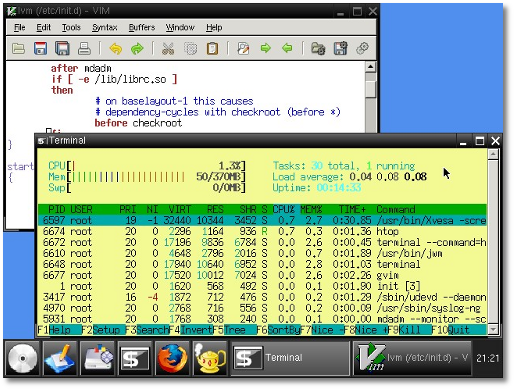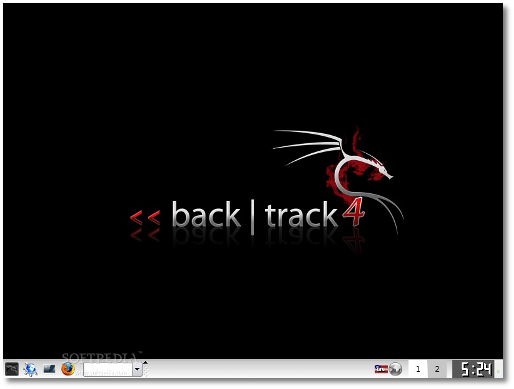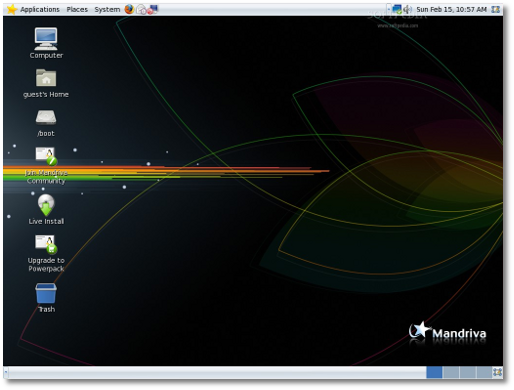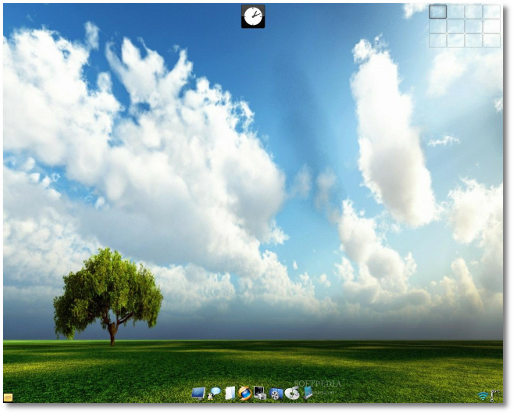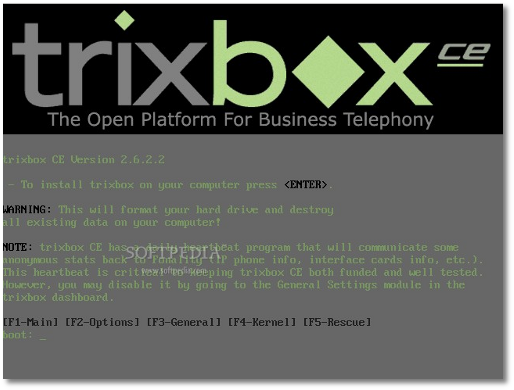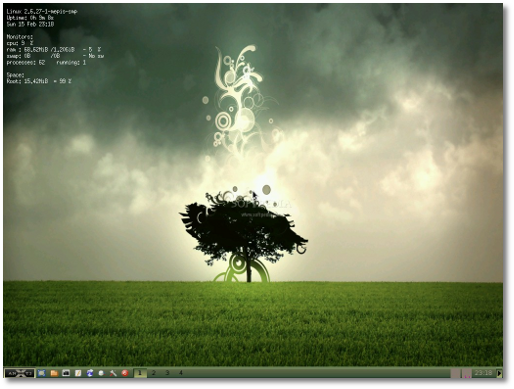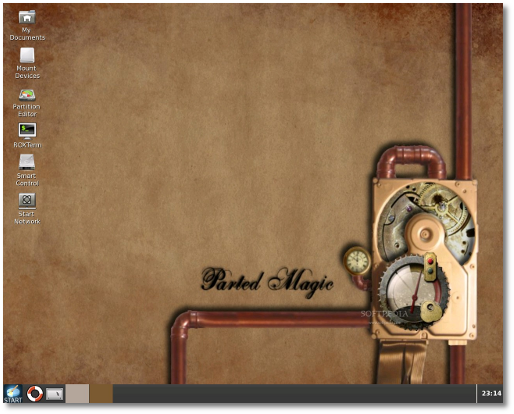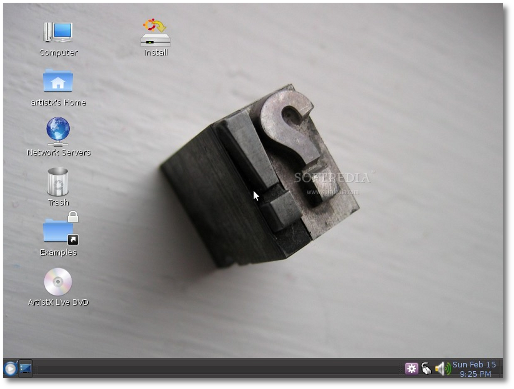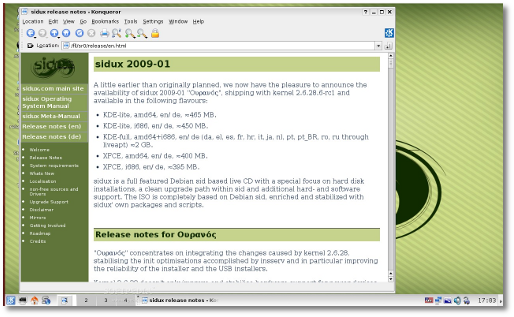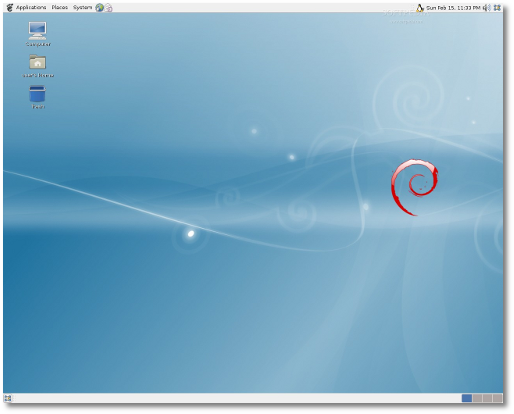Welcome to the 33rd issue of Softpedia Linux Weekly!
This week's editorial wants your opinion about the Linux version of the popular Yahoo! Messenger client. In the Linux distribution announcement section you will find the following releases: SystemRescueCd 1.1.5, BackTrack 4 Beta, Mandriva 2009.1 Beta, Elive E17 Compiz, Parted Magic 3.6, antiX MEPIS 8, trixbox 2.6.2.2, ArtistX 0.6, sidux 2009-01 and Debian 5.0. In other news: AviDemux 2.4.4 brings improved support for the H.264 video codec; after one year of development, the popular Avant Window Navigator reaches version 0.3.2; the new Nvidia video drivers for Linux bring full OpenGL 3.0 support and World of Goo finally arrives to the Linux platform! The weekly ends with the video clip of the week, the latest Linux distributions released/updated last week and the development releases.
 Summary:
Summary:

 Editorial: Yahoo's Instant Messenger Client for Linux - a Relic? - by Daniel Pop-Silaghi
Editorial: Yahoo's Instant Messenger Client for Linux - a Relic? - by Daniel Pop-Silaghi
· These days, it's clear that the big battle for instant messengers is fought between Microsoft and Yahoo! And while we couldn't really expect a Linux port of the "Windows Live Messenger," Yahoo! at least could show some love (it's the season...) to us weird geeks who enjoy rotating desktops and messing with terminals.
And the big question here is: Why in the world can't a billion-dollar company with thousands of employees do without some bucks and build a client for Linux too? Is it really so hard? Come on... With a Linux community that keeps growing and growing, and a corporation like Microsoft that will never ever release a native IM client for an operating system other than their own, it's a great business opportunity for Yahoo! to tap in this minority. Don't you agree?
Well, actually Yahoo! did a Linux version of their popular instant messenger client, back in 2003, when they released version 1.0.4 for Debian and Red Hat OSes... but that was pretty much it. And, after some time, they released version 1.0.6 (Red Hat only) on some obscure subpage of theirs, but nothing that could transpire some interest for Linux. So, what happened? I mean, I know that back then Linux was not as popular as it is today... but what exactly made them stop the development?
I even tried to install the 1.0.4 version on Ubuntu, but when it put me on a wild search for old, obsolete packages I decided it was just not worth it. I looked at some screenshots of 1.0.4 too and congratulated myself again for not trying too much to install this vintage piece of software.
And now, some of you will say: "But hey, there are a lot of other ways you can connect to Yahoo Messenger." I know, I know, but it's not the same. Pidgin is really great and all that, but you'll miss the dedicated client, especially if you come from a Windows platform. Also, Pidgin has no voice/video chat, no audibles, no games, and the file transfer is still very buggy... Not that I really cling to those features (I like Pidgin even on a Windows machine) but a lot of users do. How will you explain to your less-into-computers friends that there's no more "BUZZ!!" button and no more "Falling hearts" IMVironment when you put them in front of a Linux desktop? Oh, and did you know that Pidgin doesn't encrypt your passwords? But, that's subject for another editorial.
The point I am trying to make here is that I just can't wrap my head around the idea that a huge company like Yahoo! will basically ignore many millions of potential users. Do you think that if we join our forces, Yahoo! is going to listen to us and release a proper and usable version of its messenger?

Linux distributions announced last week:
 On February 9th, François Dupoux announced the immediate availability of SystemRescueCd 1.1.5, a Gentoo-based Linux distribution. Coming with an updated Linux kernel, now at version 2.6.27.14, SystemRescueCd has better support for reiser4 and EXT4 filesystems. Moreover, GParted 0.4.2 was included in the release, bringing EXT4 and LVM support, and for speedier file searching and help, the whatis/locate databases were created.
On February 9th, François Dupoux announced the immediate availability of SystemRescueCd 1.1.5, a Gentoo-based Linux distribution. Coming with an updated Linux kernel, now at version 2.6.27.14, SystemRescueCd has better support for reiser4 and EXT4 filesystems. Moreover, GParted 0.4.2 was included in the release, bringing EXT4 and LVM support, and for speedier file searching and help, the whatis/locate databases were created.
Highlights of SystemRescueCd 1.1.5:
· Updated standard Linux kernel packages to version 2.6.27.14; · Updated FSArchiver to version 0.4.1; · Included EXT4 filesystem support in the kernel packages; · Updated GRUB to version 0.97-r9 in order to support the EXT4 filesystem; · The Brtfs filesystem was updated to version 0.18; · Updated NTFS-3G to version 2009.1.1; · Updated e2fsprogs to version 1.41.4, with support for the EXT4 filesystem; · Updated GParted to version 0.4.2, with support for the EXT4 filesystem and LVM; · A patch from Fedora was included in the tar packages in order to support xattr/acl/selinux; · Fixed sysresccd-cleansys; · In order to quickly find files, a whatis and locale databases were created; · Fixed the autorun scripts of the ISO image.
Download SystemRescueCd 1.1.5 right now from Softpedia.

 On February 11th, the team behind the BackTrack project announced the release of BackTrack 4 Beta, boasting major changes and a great deal of new features. BackTrack 4 Beta is now based on Debian packages and uses Ubuntu software repositories, this change allowing any updates that are deployed to be immediately applied.
On February 11th, the team behind the BackTrack project announced the release of BackTrack 4 Beta, boasting major changes and a great deal of new features. BackTrack 4 Beta is now based on Debian packages and uses Ubuntu software repositories, this change allowing any updates that are deployed to be immediately applied.
Highlights of Backtrack 4 Beta:
· Linux kernel 2.6.28.1; · Debian Based; · Improved hardware support; · PXE support; · SAINT EXPLOIT, a network vulnerability assessment tool; · MALTEGO 2.0.2, an open source intelligence and forensic tool; · mac80211 wireless drivers; · Pico e12 and e16 cards are now 100% functional with native support, enabling BackTrack 4 to take advantage of everything these incredibly small devices have to offer; · Unicornscan, an information gathering and correlation engine is fully functional and features a web front end and postgress logging support; · RFID support; · Pyrit CUDA support.
Download Backtrack 4 Beta right now from Softpedia. Remember that this is a beta release and it should NOT be installed on production machines. It is intended to be used for testing purposes only.

 On February 12th, Mandriva announced the beta version of the upcoming Mandriva Linux 2009.1 (Spring) distribution. This beta release brings a Live CD, for anyone who wants to test it without installing it, and some of the hottest Linux technologies, such as: Linux kernel 2.6.28, X.org Server 1.5.99.902, KDE 4.2, GNOME 2.26 Beta, XFCE 4.6 Beta 3, OpenOffice.Org 3.0.1, LXDE, Python 2.6.1 and above all that, support for the EXT4 filesystem, in the installer.
On February 12th, Mandriva announced the beta version of the upcoming Mandriva Linux 2009.1 (Spring) distribution. This beta release brings a Live CD, for anyone who wants to test it without installing it, and some of the hottest Linux technologies, such as: Linux kernel 2.6.28, X.org Server 1.5.99.902, KDE 4.2, GNOME 2.26 Beta, XFCE 4.6 Beta 3, OpenOffice.Org 3.0.1, LXDE, Python 2.6.1 and above all that, support for the EXT4 filesystem, in the installer.
Highlights of Mandriva Linux 2009.1 Beta:
· Linux kernel 2.6.28 (with EXT4); · KDE 4.2; · GNOME 2.25.90; · XFCE 4.6 RC1; · Qt 4.5.0 RC1; · Syslinux 3.73; · X.org server 1.5.99.902; · OpenOffice.Org 3.0.1; · Python 2.6.1; · Eclipse 3.4.1; · ltsp 5; · module-init-tools 3.6; · Diskdrake improvements.
Download Mandriva 2009.1 Beta right now from Softpedia. Remember that this is a beta release and it should NOT be installed on production machines. It is intended to be used for testing purposes only.

 For Valentine's Day we prepared a first look at the upcoming Elive E17 Compiz, a special version of the popular Elive E17, bundled with all the good 3D stuff. Knowing Elive's reputation of being one of the most beautiful and stylish distributions out there, what can really go wrong if you combine two of Linux's most valuable eye-candy providers?
For Valentine's Day we prepared a first look at the upcoming Elive E17 Compiz, a special version of the popular Elive E17, bundled with all the good 3D stuff. Knowing Elive's reputation of being one of the most beautiful and stylish distributions out there, what can really go wrong if you combine two of Linux's most valuable eye-candy providers?
Download Elive E17 Compiz 1.9.22-4 right now from Softpedia. Remember that this is an unstable release and it should NOT be installed on production machines. It is intended to be used for testing purposes only.

 On February 13th, Andrew Gillis officially announced the immediate availability of the trixbox 2.6.2.2 Linux distribution. The release fixed all problems related to a non-working package manager and some kernel-panics caused by several PSTN cards. Also included in this version are some Graphical User Interface fixes and improvements. Support for newer Realtek network cards is also a highlight of this release.
On February 13th, Andrew Gillis officially announced the immediate availability of the trixbox 2.6.2.2 Linux distribution. The release fixed all problems related to a non-working package manager and some kernel-panics caused by several PSTN cards. Also included in this version are some Graphical User Interface fixes and improvements. Support for newer Realtek network cards is also a highlight of this release.
Download trixbox 2.6.2.2 right now from Softpedia.

 Also on February 13th, the team behind the AntiX project announced the release of AntiX MEPIS 8.0 (codename Intifada), a fast and lightweight Linux distribution based on SimplyMEPIS and Debian Testing, including some features of sidux as well.
Also on February 13th, the team behind the AntiX project announced the release of AntiX MEPIS 8.0 (codename Intifada), a fast and lightweight Linux distribution based on SimplyMEPIS and Debian Testing, including some features of sidux as well.
Highlights of AntiX MEPIS 8.0:
· Iceweasel 3.0.6, as the default web browser; · Pidgin 2.4, as the default instant messaging; · Abiword 2.6.4, as the default text editor; · Gnumeric 1.8-3, as the default spreadsheet editor; · ROX-Filer X Window System, as the default file manager; · Calws-Mail 3.5, as the default e-mail client.
Download antiX MEPIS 8.0 right now from Softpedia.

 On Valentine's Day, Patrick Verner decided to offer for download an improved and updated version of his very popular Parted Magic Live CD, a Slackware-based Linux distribution designed to help users with hard disk partitioning and recovery tasks. Parted Magic 3.6 is a special version, because Patrick Verner decided to completely change the way his distro boots and behaves. Therefore, he removed Splashy because it ate too much RAM and caused some weird behavior in ttys.
On Valentine's Day, Patrick Verner decided to offer for download an improved and updated version of his very popular Parted Magic Live CD, a Slackware-based Linux distribution designed to help users with hard disk partitioning and recovery tasks. Parted Magic 3.6 is a special version, because Patrick Verner decided to completely change the way his distro boots and behaves. Therefore, he removed Splashy because it ate too much RAM and caused some weird behavior in ttys.
Patrick Verner also restored the highly requested "Live" option and added a "Live with low RAM settings" one in the GRUB boot menu (see the picture below for details). The latter will allow the use of Parted Magic on computers with no more than 128 MB of RAM. Moreover, Parted Magic 3.6 comes with a new application, called "mount-gtk," which changes the way the devices are mounted by offering an intuitive graphical user interface.
Last but not least, Parted Magic 3.6 fixes the way Parted Magic PXE works, corrects some grammar and menu errors and restores version 0.3.2 of the xfburn package, because 0.4.0 failed to correctly detect devices.
Download Parted Magic 3.6 right now from Softpedia.

 Also on February 14th, Marco Ghirlanda announced the immediate availability of ArtistX 0.6, now created with the help of the Remastersys Live CD creation software. Using Linux kernel 2.6.27, ArtistX 0.6 lets you choose between GNOME 2.24 and the recent KDE 4.2 desktop environments and has Compiz Fusion included for a full 3D-effects experience.
Also on February 14th, Marco Ghirlanda announced the immediate availability of ArtistX 0.6, now created with the help of the Remastersys Live CD creation software. Using Linux kernel 2.6.27, ArtistX 0.6 lets you choose between GNOME 2.24 and the recent KDE 4.2 desktop environments and has Compiz Fusion included for a full 3D-effects experience.
Having plenty of space on a DVD, ArtistX comes with almost 2500 free multimedia applications designed for all Linux users. This version is based on the latest stable Ubuntu 8.10 (Intrepid Ibex) release and features the Ubiquity installer.
Download ArtistX 0.6 right now from Softpedia.

 On the same day, Stefan Lippers-Hollmann announced the release of sidux 2009-01 (Ουρανός), a Debian Unstable (sid)-based Linux Live CD. Featuring the 2.6.28.6 RC1 kernel, sidux 2009-01 can be used with KDE, KDE-lite or the lightweight XFCE, on both 32-bit and 64-bit platforms. sidux, intended for hard disk installations, provides an efficient upgrade path and extra hardware and software support. The 2009-01 release mainly focuses on implementing the changes in the 2.6.29 Linux kernel, ensuring integration for the innserv init optimizations and improving the install process, especially on USB devices.
On the same day, Stefan Lippers-Hollmann announced the release of sidux 2009-01 (Ουρανός), a Debian Unstable (sid)-based Linux Live CD. Featuring the 2.6.28.6 RC1 kernel, sidux 2009-01 can be used with KDE, KDE-lite or the lightweight XFCE, on both 32-bit and 64-bit platforms. sidux, intended for hard disk installations, provides an efficient upgrade path and extra hardware and software support. The 2009-01 release mainly focuses on implementing the changes in the 2.6.29 Linux kernel, ensuring integration for the innserv init optimizations and improving the install process, especially on USB devices.
Highlights of sidux 2009-01:
· X.Org 7.3; · KDE 3.5.10; · A new art theme; · Support for Intel Pro Wireless 3945 chipsets; · Memtest86+; · OpenJDK 6; · Support for Logitech Quickcam Orbit, Logitech Quickcam Pro for Notebooks, Logitech Quickcam Pro 5000, Asus Eee PC webcams; · SquashFS4; · Printers are now handled by hal-cups-utils.
Download sidux 2009-1 right now from Softpedia.

 Looks like Valentine's day was a busy day for Linux developers, as Debian, the base for many popular Linux distributions such as Ubuntu, KNOPPIX or Damn Small Linux reached, after 22 months of development, version 5.0. Debian Lenny comes with Linux kernel 2.6.26, bringing support for read-only bind mounts, a kernel debugger and greatly improved webcam support. This kernel also features a built-in memory tester, KVM ports and many other small improvements. The NTFS-3G driver that allows fast and secure reading/writing of NTFS partitions is now a part of Debian.
Looks like Valentine's day was a busy day for Linux developers, as Debian, the base for many popular Linux distributions such as Ubuntu, KNOPPIX or Damn Small Linux reached, after 22 months of development, version 5.0. Debian Lenny comes with Linux kernel 2.6.26, bringing support for read-only bind mounts, a kernel debugger and greatly improved webcam support. This kernel also features a built-in memory tester, KVM ports and many other small improvements. The NTFS-3G driver that allows fast and secure reading/writing of NTFS partitions is now a part of Debian.
Highlights of Debian 5.0:
· KDE 3.5.10; · OpenOffice.org 2.4.1; · GIMP 2.4.7; · Iceweasel 3.0.6; · Default support for multimedia keys; · Default CPU frequency scaling for notebooks; · gParted 0.36; · A large fonts database; · OpenJDK; · GNU Java compiler; · Python 2.5.2 and 2.4.6; · Icedove 2.0.0.19; · Emacs 22; · New "Debian MoreBlue Orbit" artwork featuring beautiful blue colors and swirly shapes; · X.Org 7.3 with RandR 1.2 support on ATI, Intel and several G80 boards.
Download Debian GNU/Linux 5.0 right now from Softpedia.
Download Debian Live 5.0 right now from Softpedia.
· The Avidemux developers announced on February 8th the release of Avidemux 2.4.4. This bugfix version is probably the last one from the 2.4.x series, as the developers will concentrate their attention on the upcoming 2.5 and 2.6 branches. While the Avidemux 2.5 will be a big "code clean-up" and modularization branch, the Avidemux 2.6 is a long-term overhaul of the source code, which means that the developers will switch from a frame-based, constant frame rate model to a time-based one... fixing all the audio/video sync issues encountered on files with a variable frame rate, such as MPEG or FLV. Read more about it here.

· The Avant Window Navigator team made quite a leap on February 9th, when they released version 0.3.2 of their dock-like application. The announcement comes after a whole year of bugfixing and improving overall performance. Though the next version after 0.2.6 should have been 0.2.8, developers didn't show enough interest, which resulted in its cancellation. Avant Window Navigator 0.3.2 brings quite a lot of goodies for everyone, be they users, packagers or developers. Read more about it here.

· On February 11th, Nvidia proudly presented yet another improved version of their proprietary video driver for the Linux, FreeBSD and Solaris open source operating systems. The new version, Nvidia 180.29, offers full OpenGL 3.0 support for all GeForce 8 and newer graphics cards. It also provides support for the following GPUs: GeForce 9300 GE and Quadro NVS 420. The Nvidia 180.29 video driver was also updated yesterday, by the Ubuntu developers, in the daily build of the upcoming Ubuntu 9.04 (Jaunty Jackalope). Read more about it here.

· 2D Boy announced last week the immediate availability of their popular World of Goo game for the Linux platform. Released back in October 2008 for both Windows and Mac OS platforms, World of Goo is an addictive puzzle that may look simple at first but the more you play the more challenging it gets. Read more about it here.

 Video Clip of the Week: Ubuntu on HP Mini 1000
Video Clip of the Week: Ubuntu on HP Mini 1000
· For this week we will present a video clip that showcases the Ubuntu 8.10 (Intrepid Ibex) operating system on the HP Mini 1000 netbook. The video is 3:24 minutes long and it was posted by wrxman81. Enjoy!
· Debris Linux 1.0.4 · Dotsch/UX 1.0
 Distributions Updated Last Week:
Distributions Updated Last Week:
· Tiny Core Linux 1.1 · Knoppix 6.0.1 · INX 1.1 · Whitix 0.2a · CDlinux 0.9.1 · R.I.P. 7.6 · Debian 4.0r7 · Debian Live 5.0
· SimplyMEPIS 8.0 RC3 · ClarkConnect 5.0 Alpha 1 · g:Noblin 3.0 Beta 1 · GParted LiveCD 0.4.3-1 · Parsix Linux 2.0 Test 2 · Kuki Linux 3.0 RC1
See you again next Monday, February 23rd, for another issue of Softpedia Linux Weekly.
The Softpedia Linux Editorial Team.
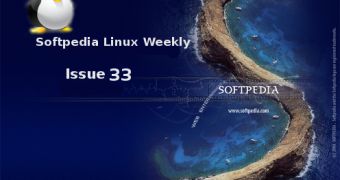
 14 DAY TRIAL //
14 DAY TRIAL // 